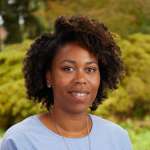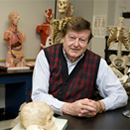Page 12 • (1,156 results in 0.024 seconds)
-
There are some great benefits to joining a new program at PNWU School of Physical Therapy. Some highlights: small faculty to student ratios, state-of-the-art cadaver dissection laboratory, simulation center, and the Center for Applied Movement Sciences lab. The Center for Applied Movement Sciences lab is part of…
New DPT program at PNWU PNWU School of Physical Therapy Posted by: alemanem / March 7, 2023 March 7, 2023 There are some great benefits to joining a new program at PNWU School of Physical Therapy. Some highlights: small faculty to student ratios, state-of-the-art cadaver dissection laboratory, simulation center, and the Center for Applied Movement Sciences lab. The Center for Applied Movement Sciences lab is part of PNWUs pro bono clinic campus where students have an opportunity to work with
-

Assistant Professor of Biology | Department of Biology | lnervo@plu.edu | 253-535-7376 | My discipline of interest is developmental biology, which is the study of the processes needed for animals and plants to grow and develop. Developmental Biology is an excellent field that intersects, genetics, cell biology, molecular biology, physiology and comparative anatomy to answer key organismal growth questions.
Lathiena Nervo Assistant Professor of Biology she/her/hers Phone: 253-535-7376 Email: lnervo@plu.edu Office Location: Rieke Science Center - 148 Curriculum Vitae: View my CV Professional Biography Education Ph.D., Developmental Biology, University of Maryland - Baltimore County, 2015 B.S., Biological Sciences, University of Maryland - Baltimore County, 2004 Selected Presentations Manning,L.A., Ronk,H., Sewell, M.,Peifer, M., The scaffold protein Canoe and ZO1/Polychaetoid work together to
-
The PLU Psychology colloquium series aims to provide PLU students, faculty and staff rich, meaningful exposure to the state of the art in research in psychology.
during visual search"University of Colorado, Denver November 2, 2023Laura Shneidman, Ph.D. Melvin Rouse, Ph.D."The social self, the biological self: how biological phenotype and social behavior can inform one another."University of Puget Sound October 13, 2023Christina Zhao, Ph.D."Small children, big data: Using neuro- and data science to support early language acquisition"University of Washington October 6, 2023Jennifer Lindsay, Ph.D."Page by Page: Exploring How Gender Representation in Children’s
-
Priya McBride, '16, Biology: My Botany Tutorial was led by Oxford Professor Mr. Timothy Walker, Lecturer in Plant Sciences at Somerville College.
Plant Sciences at Somerville College. Each week I was assigned an essay topic and given a list of readings pertaining to that topic. After researching the essay topic, I then wrote an essay of approximately 2,000 to 2,500 words, answering the prompt. For each essay I spent about 10–20 hours researching the topic prior to writing the essay. After writing each essay I would email it to my professor, and we would discuss it at our next meeting. My professor and I met for an hour once a week for the
-

Professor Emeritus of Biology | Department of Biology
Jerrold Lerum Professor Emeritus of Biology Website: https://www.plu.edu/biology/jerrold-lerum/ Professional Education Ph.D, Biological Science, Northwestern University, 1973 M.S, Zoology, University of Wisconsin, 1965 B.A., Biology and Chemistry, Luther College, 1963 Areas of Emphasis or Expertise Reproductive Biology
Area of Emphasis/Expertise -
Sunday, January 25, 2015 • 7:00pm Shared Concert with Chattanooga School for the Arts and Sciences Creed Bates Auditorium 865 E 3rd St.
Pacific Lutheran University Wind Ensemble performs in ChattanoogaSunday, January 25, 2015 • 7:00pm Shared Concert with Chattanooga School for the Arts and Sciences Creed Bates Auditorium 865 E 3rd St. Chattanooga, Tennessee The Pacific Lutheran University School of Arts and Communication and the Department of Music are pleased to announce that their University Wind Ensemble will appear in concert at Creed Bates Auditorium, Chattanooga School for the Arts and Sciences, January 25th at 7:00pm
-
NYU Columbia University University of British Columbia George Washington University Norwegian University of Life Sciences University of Washington-Jackson School of International Studies Fulbright
Alumni Graduate StudiesWhere Recent Majors Have Gone For Graduate Study: NYU Columbia University University of British Columbia George Washington University Norwegian University of Life Sciences University of Washington-Jackson School of International Studies Fulbright Study Award-Arctic University of Norway University of Colorado Vanderbilt University Graduate Institute for International and Development Studies, Geneva, Switzerland Washington University, St. Louis University of Kentucky
-
In May 2000, a grant was awarded to the Division of Social Sciences for a student-faculty research program to honor S. Erving Severtson.
S. Erving Severtson Research Fellowship Forest Foundation Undergraduate Research Program In May 2000, a grant was awarded to the Division of Social Sciences for a student-faculty research program to honor S. Erving Severtson. Endowed by the Forest Foundation, the grant seeks to encourage joint student and faculty research by providing financial assistance. For student researchers, the grant covers up to $500 for project expenses and a $2500 award per student. Faculty are also eligible for up to
-
Learning Outcomes for BS and BA in Mathematics (BSM, BA) (Developed with reference to the MAA’s 2015 Curriculum Guide to Majors in the Mathematical Sciences.
Program Learning OutcomesLearning Outcomes for BS and BA in Mathematics (BSM, BA) (Developed with reference to the MAA’s 2015 Curriculum Guide to Majors in the Mathematical Sciences.) Communication: Be able to read, interpret, write about, and talk about mathematics. Computation: Develop computational, algorithmic, and technological problem-solving fluency. Disciplinary Citizenship: Develop collaborative skills, independence, perseverance, and experience with open-ended inquiry. A. Abstraction
-
The Anderson research group addresses three domains in the physical sciences: chemical reactivity viewed from the microscopic perspective of electron structure, molecular orbitals and reactivities
to the National Academy of Sciences, the American Philosophical Society and the American Academy of Arts and Sciences, and a frequent contributor to National Research Council Reports. He is a Fellow of the American Geophysical Union and the American Association for the Advancement of Sciences Arthur L. Day Prize and Lectureship; the E.O. Lawrence Award in Environmental Science and Technology; the American Chemical Society’s Gustavus John Esselen Award for Chemistry in the Public Interest; and the
Do you have any feedback for us? If so, feel free to use our Feedback Form.


